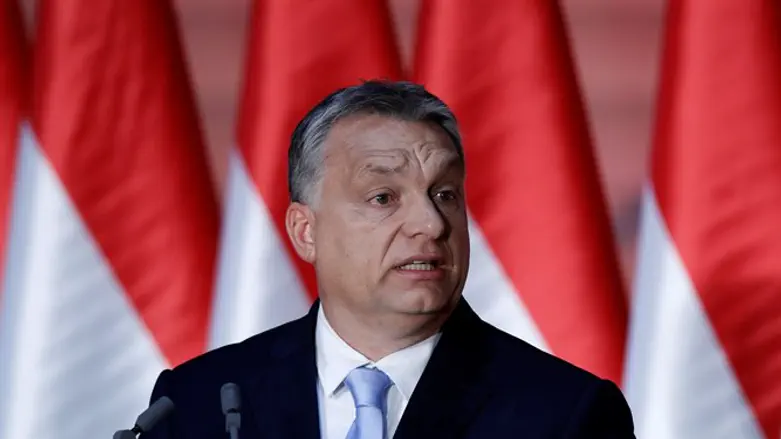
Prominent Jewish leaders on Thursday met with Hungarian Prime Minister Viktor Orban and his deputy during a visit to the Hungarian Jewish Community initiated by the Rabbinical Center of Europe.
The delegation consisted of Israel’s Chief Rabbi, Rabbi David Lau, General Director of the Rabbinical Center of Europe and European Jewish Association, Rabbi Menachem Margolin and Hungarian Rabbis, Rabbi Baruch Oberlander and Rabbi Shlomo Kovesh, Head of the EMIH community.
Members of the delegation, who inaugurated the opening of a new kosher slaughterhouse in the country a day earlier, thanked Orban for his commitment to freedom of religion and to the eradication of anti-Semitism.
"The Prime Minister of Hungary Mr. Viktor Orban and his deputy, Mr. Zsolt Semjén, are well aware of the challenges they face in their fight against anti-Semitism, but we were deeply impressed by their commitment and the unconditional support they offer for the continuation of Jewish religious life in the country," said Rabbi Margolin.
During the meeting, Chief Rabbi Lau expressed his appreciation for the Hungarian government and its leaders efforts to eradicating anti-Semitism and allow full religious freedom, and for their help to maintain kosher Jewish slaughter in the country.
"In times like these, when the Belgian parliament passes a law banning kosher slaughter and other countries are undermining freedom of religion all over Europe, we were happy to inaugurate a new kosher slaughterhouse and to witness the help of the government to the Hungarian religious Jewish community" said Chief Rabbi Lau and Rabbi Margolin.
Orban recently came under fire from local Jewish groups for praising Adolf Hitler ally Miklos Horthy.
In a speech in Parliament on June 21, Orban called Horthy and other Hungarian leaders “exceptional statesmen” for leading the country after the traumatic disintegration of the Austro-Hungarian Empire after World War I.
Horthy, an autocrat who ruled Hungary from 1920 to 1944, passed anti-Jewish laws and oversaw the first wave of deportations of Hungarian Jews in 1944.
Hungary has experienced something of a Horthy cult revival in recent years, with new statues dedicated to him and streets named after him.
A park has already been named after him in Gyomro, on the outskirts of Budapest. In 2013, a bust of Horthy was unveiled outside a Budapest church, causing protests among locals.
This week, Israel accepted a clarification from Hungary's Foreign Minister regarding Orban's remarks.
The Foreign Minister, Peter Szijjarto, spoke by phone to Israel's Ambassador to Budapest, making clear to him that the Hungarian government had zero tolerance for any kind of anti-Semitism.
Szijjarto also said that he clarified that “the regime of Miklos Horthy had its positive times but also very negative times and we must respect the historical facts that clearly indicate this.”
Jewish groups in Hungary have sometimes accused Orban's right-wing government, in power since 2010, of downplaying Hungary's role in the Holocaust during which some 600,000 Hungarian Jews perished.
In 2015, however, Orban admitted his country’s role in the Holocaust, saying many Hungarians chose "bad instead of good" in helping deport Jews to Nazi death camps.